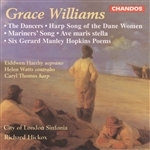Richard Hickox conducts an exciting combination of musicians in this unique collection of music from one of Wale’s foremost composers.The music of Grace Williams has been shamefully under-recorded. The works featured on this disc are premiere recordings.
Grace Williams was born in Glamorganshire in 1906. After graduating from University College, Cardiff she studied with Vaughan Williams at Royal College of Music in London. From 1931 she worked in London, first as a teacher and then with the BBC. During the 1930’s she became friendly with Benjamin Britten who secured a number of film-music commissions for her. Towards the end of her life she returned to her home town where she devoted herself to composition and to freelance teaching, and broadcasting.
The Dancers, composed in 1951, is scored for soprano, women’s choir, string orchestra and harp. The first song is a charmingly fresh setting for soprano solo, of verses from a collection of Songs from Cyprus. After a suitably spirited setting of Belloc’s well-known Tarantella, soloist and choir join together for the first time in the deeply expressive Roundelay of Chatterton, which the composer sets as a kind of threnody. Grief is dispelled and death is transcended in the settings of verses by May Sarton and Kathleen Raine. As the soloist sings in the final song, "I will dance away death on the wild hills..."
The Two Choruses (Harp Song and Mariners’ Song) was Williams’s last complete work and it is fitting that its subject should be the sea, which had been such a constant source of inspiration to her throughout her life. The work as a whole is remarkably adventurous for so late a composition.
Musical images of the sea are much to the fore again in the setting for unaccompanied chorus of Ave maris stella. The first three words of the hymn are used as a refrain, and the supple phrases of the music suggest the soft swell of the sea.
When Grace WIlliams was commissioned to write a song-cyle for the 1958 Chaeltenham Festival she set herself no easy task by selecting poems by Gerard Manley Hopkins (notoriously on of the most difficult poets to set) and then deciding on a string sextet to accompany the voice. It is a measure of her remarkable talent that this collection is often regarded as one of her finest works.


 Available only as a playable CDR
Available only as a playable CDR














 My Wish List
My Wish List




